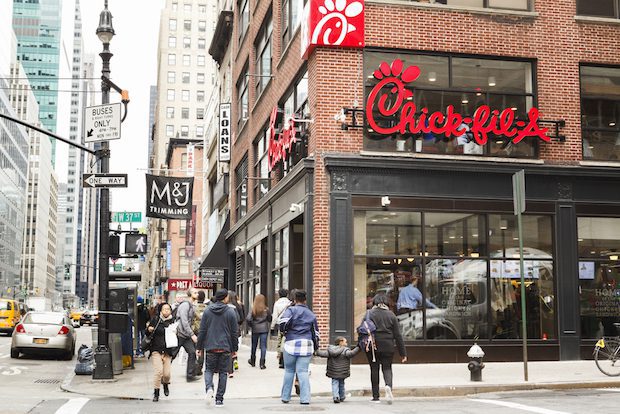Yankee Bigot Scared Of Chick-Fil-A

In terms of parochial, un-self-aware narrow-mindedness, it is hard to beat this piece from the New Yorker on how the a popular purveyor of delicious chicken and waffle fries is making Manhattan into an unsafe space. Here’s the headline:

“Creepy”. It’s a fast-food joint, you woke twerp!
Excerpts:
New York has taken to Chick-fil-A. One of the Manhattan locations estimates that it sells a sandwich every six seconds, and the company has announced plans to open as many as a dozen more storefronts in the city. And yet the brand’s arrival here feels like an infiltration, in no small part because of its pervasive Christian traditionalism. Its headquarters, in Atlanta, is adorned with Bible verses and a statue of Jesus washing a disciple’s feet. Its stores close on Sundays. Its C.E.O., Dan Cathy, has been accused of bigotry for using the company’s charitable wing to fund anti-gay causes, including groups that oppose same-sex marriage. “We’re inviting God’s judgment on our nation,” he once said, “when we shake our fist at him and say, ‘We know better than you as to what constitutes a marriage.’ ” The company has since reaffirmed its intention to “treat every person with honor, dignity and respect,” but it has quietly continued to donate to anti-L.G.B.T. groups. When the first stand-alone New York location opened, in 2015, a throng of protesters appeared. When a location opened in a Queens mall, in 2016, Mayor Bill de Blasio proposed a boycott. No such controversy greeted the opening of this newest outpost. Chick-fil-A’s success here is a marketing coup. Its expansion raises questions about what we expect from our fast food, and to what extent a corporation can join a community.
Where are the thinkpieces in the New Yorker interrogating Muslim and Hasidic Jewish-owned businesses, asking whether they should be allowed to “join” the New York community? They don’t exist. Evangelical Christians and the food prepared in restaurants they own are a unique threat to New Yorkers, it would seem. They probably make nugget breading from the blood of kidnapped theybies.
Here, the author attacks the famous Chick-fil-A cows:
It’s worth asking why Americans fell in love with an ad in which one farm animal begs us to kill another in its place. Most restaurants take pains to distance themselves from the brutalities of the slaughterhouse; Chick-fil-A invites us to go along with the Cows’ Schadenfreude. In the portraits at the Fulton Street restaurant, the Cows visit various New York landmarks. They’re in Central Park, where “eat mor chikin” has been mowed into the lawn. They’re glimpsing the Manhattan Bridge from Dumbo, where they’ve modified a stop sign: “stop eatin burgrz.” They’re on the subway, where the advertisements . . . you get the picture. The joke is that the Cows are out of place in New York—a winking acknowledgment that Chick-fil-A, too, does not quite belong here.
Its arrival in the city augurs worse than a load of manure on the F train.
Again, this is beyond parody. Read the whole thing — note that the author accuses Chick-fil-A of being infected with “suburban piety” — and chortle. Finally, the cherry on top, is the piece’s description of the author:
Dan Piepenbring is a writer based in Brooklyn.
Of course he is! Of course.
All that is funny. But here’s what’s not funny.
Would the New Yorker have published a piece critical of a fast-food chain owned by pious Muslims, characterizing their appearance in New York City as an “infiltration,” and saying that because of its ownership, the restaurants do “not quite belong here”? Of course it wouldn’t. So why do they single out Evangelicals for this spiteful treatment? I think we know the answer, but I wish editors at the magazine would ask themselves this question.
And I wish they would ask themselves how they would respond if a magazine somewhere out in Jesusland published a piece stating that the local opening of a national chain stored owned by Orthodox Jews amounts to an “infiltration,” and that the Jewish-owned store “does not quite belong here.”
I love the New Yorker, and have subscribed to it for years (and it has loved me back). But this Piepenbring piece is not only an example of laughable cosmopolitan hickishness, it is rank anti-Christian bigotry.
Subscribe for as little as $5/mo to start commenting on Rod’s blog.